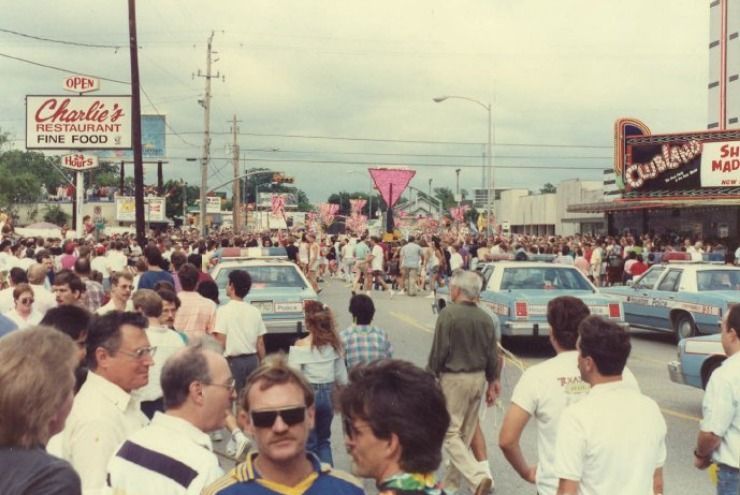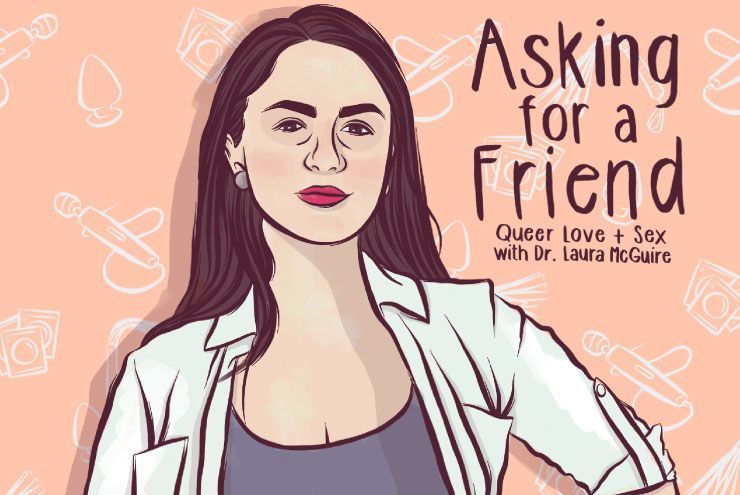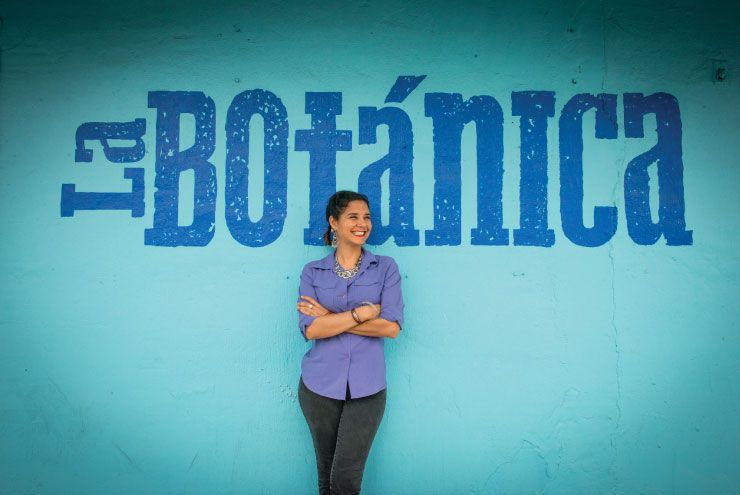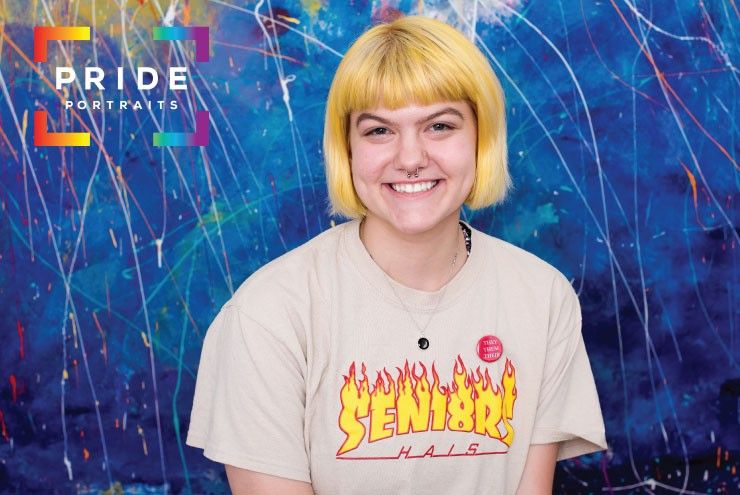By Chris Patton
I was a weird kid. I was, in fact, a weird, queer kid. I was, further, a weird, queer kid who did musical theatre, had agoraphobia, and, as I reached my teens, listened exclusively to New Wave music, wore eyeliner, dressed strictly in monochrome, and dyed my hair blue—all in Houston during the 1980s. And just to frame the timeline exactly, when I say I was a kid in the ‘80s, I literally mean I was aged nine through eighteen from the years 1980–1989. Consequently, I’m part of the small pocket of Gen-Xers that has the ‘80s permanently emblazoned on the domed movie screen of their brains. I’m a sub-category of a sub-genre, you might say—an outsider in a frequently overlooked generation. And yes, that does mean that I often listen not only to the music of my youth, but to Retrowave, Synthwave, and modern Indie that basically sounds like ‘80s Alternative; that I fall asleep to the Blade Runner soundtrack; and have been giddy about, and confused by, the fact that so many pieces of modern pop culture have, and continue to, pay homage to the so-called “decade of excess.” For we “weirdos,” it was much more the decade of Depeche Mode/The Cure/Duran Duran (my holy musical triumvirate), teen dance clubs, living in fear of nuclear war and AIDS, and regularly middle-finger saluting Reagan and Thatcher. I danced through my sixteenth through nineteenth years across numerous Houston dance floors as Post-Punk and Synthpop yielded more to Industrial, and heard that genre cave, eventually, to Nu Beat, House, and Rave. Rave was where I checked out of the club scene and re-joined the ranks of local theatre people. I had ducked out of theatre during most of my teens, fully immersing myself in night clubbing and basically being a “non-conforming” misfit.
All my life, having lived small bursts of it in NYC, Chicago, and Los Angeles, I’ve heard disparaging comments and invectives hurled at my hometown of Houston. Hell, I even remember a director of exclusively queer theatre in Houston once describe it as having “no soul.” I’ve seen and heard visitors to Houston become agog and practically gape-mouthed at the fact that Houston was not only art-friendly, and in fact art-rich, but also queer-friendly. And, since returning to Houston from Los Angeles but a few weeks ago after a two-year stint in the City of Angels and Devils, my appreciation for Houston as a place of queer, diverse, artistic expression—even during a pandemic—is stronger than ever, and I felt compelled enough by these feelings to tell this mini-story, to finally gather and express the Houston I know as a queer, Post-Punk, Gen-Xer.
I came out to my friends as bisexual at fourteen, was wearing all black or white by fifteen, and by sixteen had added makeup into the mix. “Back then,” we didn’t call it “guyliner,” and certainly didn’t try to mask it as war paint. We were just boys wearing makeup. Nights that weren’t spent at clubs were spent at friends’ houses, spontaneous hangouts that often involved putting on Nina Hagen records, trip-sitting my friends as they did acid or ecstasy, and eating junk food while we watched David Lynch films or discussed the cinematic details of Repo Man. And we suburban, Post-Punk/New Wave/Alterna teens came in all stripes, shapes, colors, and creeds. Yet we blended together like the yogurt smoothies our mothers were drinking to stay young and Jane Fonda–level fit. Our parents were Dylan, Baez, and Sprinsteen-ing into middle age, while we were creeping across dance floors to Karen Finley, Diamanda Galas, and Propaganda. Our parents had had the Downtown Houston Go-Go and Psychedelia clubs; we had teen clubs that served virgin mixed drinks and spun the latest Post-Punk and Freestyle bangers. For my set, the go-to haunts were Visions, Bee-Jays, Club Soda, and All-Ages Night at that legendary black box on Westheimer, Numbers.
As the ‘80s turned into the ‘90s and my life became just as much about theatre as it did about alternative music, I took in fascinating shows at nearly rundown theatres, where local artists were putting on shoe-string budget pieces of theatrical beauty that, had they been reported on by a national publication, would have been as lauded as anything going on at La Mama, PS 101, or any of the numerous alt theatres on the West Coast. As a young theatregoer and burgeoning actor (who was also harboring a strong desire to be a lighting designer and director), I remember being ecstatic that our city was drawing performances from the likes of Annie Sprinkle, the aforementioned provocateur Karen Finley, and at Houston’s pristine cathedral to “legit” performance, the Wortham Theater, Diamanda Galas would bring one of her mid-career tours, and Anna Deveare Smith would perform her one-woman show, Twilight: Los Angeles, 1992, about the LA Riots in the wake of the Rodney King verdict. And what blew my mind was that, by and large, not many Houstonians cared. Groundbreaking, genre-defying performers were regularly gracing our small and large stages, and yet Houston was still viewed as a cowtown. In fact, at the time of Deveare Smith’s engagement at the Wortham, one local critic quipped that most Houstonians probably wouldn’t know the difference between Anna Deveare Smith and Anna Nicole Smith. But that was not, and is not, the Houston I know.
When I tell people that I grew up a queer New Waver who became a theatrical actor, director, and voice-over artist with hundreds of credits to his name, they assume I’m an Angeleno or a New Yorker. When they hear I’m from Houston, their first utterances or exclamations, apart from those of confusion and surprise, are usually about tropical storms, Beyoncé, or humidity. Sometimes they just say, “Oh yeah, H-town!,” and sort of nod their heads. Occasionally they’ll make a joke that includes the line, “Houston, we have a problem.” And to me, none of these track with my personal history of life in Houston.
In the heteronormative macro, Houston seems to be viewed as a great place to make money, a humid, too-spread-out city built on a swamp, and “that place where they have NASA, the rodeo, and the Energy Corridor.” Oh, and gentrification. Lots of gentrification. But that’s a story for another day.
In the micro of the queer Gen-Xer, Houston was a city where we grew up lining up for sold-out screenings of The Rocky Horror Picture Show at the Alabama, the Southway Six, the Town and Country Ten, and eventually, the Bel-Air and the River Oaks theatres. A city whose suburb of Pearland gave rise to one of the greatest unsung New Wave bands of the ‘80s, The Judys. And a city where, especially as a suburban kid, the “forbidden,” mystical land of Montrose was a twenty-minute-drive-away Oz, where once a year there was a street festival, populated by every shade of queer, Punk, New Waver, No Waver, skater, and general artistic rebel. And these folx were not only in attendance, they were celebrated. Sitting almost below sea level on the Gulf Coast of a very red state, we were a burgeoning pocket of blue.
And as we grew up and moved from young adulthood to adult adulthood, we realized that, beyond the alternative scene we knew and held close to our hearts, Houston had and has a giant theatre scene, a world-class opera, ballet, and symphony, and a formidable and eclectic museum presence. And while all that is vital, cool, and impressive—and to a degree queer-adjacent, if not queer-centric, to the group of LGBTQIA folx and weirdos who grew up in Houston from the late ‘70s to the early ‘90s—just as vital to us were our teen alterna-discos, Rice Radio (KTRU, who would introduce me to countless bands I’d come to love and that mainstream radio would later co-opt), and, as soon as we were old enough to get out of the house on our own, we had Montrose and the safety it afforded those of us who lived left of center.
So, when I hear, “Houston, we have a problem,” as an identifying punchline for our city, I couldn’t agree more. We have an image problem. We have a publicity problem. We have, perhaps, a marketing problem. Even though we’re the fourth-largest city in America, we’re considered “the other big city in Texas”; the land of Urban Cowboy, Apollo 13, and gods help us, Reality Bites; a place where “it must be really tough to be gay and an artist”; assumed to be ultra-red and blandly metropolitan; and a city that suffers from zero zoning and too much urban sprawl. And maybe that’s okay. Maybe not everyone needs to know our secrets—that we have a Tony-Award-winning regional theatre; that we are the city of not only Beyoncé, but of Jim Parsons, Lizzo, Megan Thee Stallion, and queer, transformative former Mayor Annise Parker; that we have an underground theatre scene, which has finally been covered nationally; that Smithsonian magazine labeled us, in 2013, the Most Diverse City in America; that we have entire clinics and mental health and wellness centers devoted to the queer community; that we have burgeoning and already thriving, sprawling Black neighborhoods where Black artistry and entrepreneurship are the rule rather than the exception; and that there are still, in 2020, just as many Punks, New Wavers, skaters, rockers, goths, theatrical outlaws, and artistic, queer rebels, ranging from ages 16–60 as there are cowboys, business tycoons, and conservative WASPS.
To the queer Gen-Xer, Houston is a city of more mystery than mundanity, more eclecticism than banality, but maybe, as that great Indie folk jam of a few years ago says, we should just let the mystery be.








Dee
September 26, 2020 at 11:39 PMInteresting take, thanks for your story.
I, too, enjoyed places like Numbers and the Westheimer area. I also have a vivid memory of some homophobic assholes at Numbers heckling Erasure, so it wasn’t always that queer friendly. I left Houston in 1989 to get away from the racism and to pursue art school in NYC. After finding my tribe of punk dykes, I finally came out. I haven’t lived in Houston since, as my experiences there were often more bad than good, although I did have some great high school friends who also loved music, black, and plenty of hairspray. If Texas wasn’t so red and hateful, maybe more queer folks could appreciate what Houston has to offer. I personally can’t stomach it, and choose to live in a blue state where I feel safe.
Shannon T
September 27, 2020 at 11:11 AMYes!!! Love the article. I try to explain 80’s Houston to people and they don’t understand the extent to which Houston was cool, amazing, artsy, open, and the biggest small- town in the south. Also that teen clubs was where we Really lived and experienced life. It was apparently a fairly unique situation in Houston!❤️
David Folwell
September 29, 2020 at 11:34 AMGreat read, Chris. Thanks for reminding me that it wasn’t just a fluke that I pursued a life in theater. Houston supported and encouraged it. I followed your same path Houston-NY-LA. When I got to New York the first thing people would say to me when they found out I was from Texas was, “Where’s your horse?” I’m sure that they could not imagine that I spent much of my childhood on grand stages like the Alley and Jones Hall. They probably had never been on a stage that large. Houston is where I learned about Shakespeare from the Texas Shakespeare Festival, Main Street Theater and Stages Rep. and contemporary writers like Chris Durang and Charles Busch. When I moved to LA as a TV writer, I decided I wanted to be the guy who wrote about Texas, but I always had the feeling people thought that my connection to my home state made me inferior, not as well educated or worse, a possible undercover conservative! (Which I am decided NOT). Thank you for helping me remember the part of Houston that I loved; the movie houses, the clubs (I was hanging out at Numbers at the same time) and places like The Orange Show! People in LA couldn’t conceive that there is a place like that in Houston. I hope you keep up the tradition of “weirdness” now that you are back.
Chris Patton
September 29, 2020 at 11:49 PMThank you so much!
Transmit to Your Eyeholes: Week Ending 10/04/2020 – Hardcore Nudoty
October 11, 2020 at 7:38 PM[…] *Chris Patton’s The Queer and Mysterious Houston I Know for Spectrum South: A celebration of Houston’s unapologetically queer, punk, and artistic roots from a writer and performer who lived right in the middle of it during the ’80s and ’90s. The city has always been these things, but suffers from bad PR. We need more first-person accounts like this to keep our valuable cultural and subcultural history alive. […]